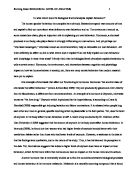There are various different types of neurotransmitters in the bran and each of them have their own effect on the human body. One example of a neurotransmitter is acetylcholine, which has a strong effect on memory and learning processes. Another is serotonin, which has an effect on sensory perception, sleep and arousal. Dopamine is a neurotransmitter which has a significant effect on motor activity and co-ordination . There is a deficiency of this neurotransmitter in victims of Parkinson’s disease.
The effect of acetylcholine was investigated in an experiment by Martinez and Kesner in 1991. In this experiment, several rats were taught how to go from one end of a certain maze to the other. They were then divided into four groups. One group was injected with scopolamine, a chemical blocking the reception of acetylcholine. Another group was injected with physostigmine, which blocks the production of cholinesterase, which clears acetylcholine. A third group was at its natural state, used as a control group. The rats were then made to go through the maze and the number of wrong turns was counted.
It was found that that those rats injected with physostigmine made fewer wrong turns than the rest and those injected with scopolamine made the most wrong turns. This experiment demonstrates the significant influence of acetylcholine on memory.
This experiment was very cleverly designed. It manipulated the independent variable, the level of acetylcholine in the rats, well through the induction of three states: A high level of acetylcholine (injection of pysostigmine); a normal level of acetylcholine (control group) and a lower level of acetylcholine (injection of scopolamine). These states clearly had an effect on the number of wrong turns taken by these rats. Despite these most significant results, the study had a significant flaw.. This was the overlooking of the ethical considerations of this experiment. The injections of chemicals into the bodies of these rats have the risk of potential harming these rats. Hence, even though this study produced significant results, it is unethical.
In 2010, research has been done into the causes of Sudden Infant Death Syndrome, which causes the death of 2300 babies a year. Autopsies were performed on 35 victims of SIDS and 7 infants who died of other chronic disorders related to the lack of oxygen.
Results show that the serotonin levels of the babies who died from sudden infant death syndrome were 26% lower than those who died from other diseases. It is explained by doctors that usually, when a baby lacks oxygen when it is asleep, it turns. This is because of serotonin which has an effect on sleep and arousal. When there is a lack of serotonin, the baby, is not woken up, hence it won’t turn, leading to a lack of oxygen, hence causing suffocation and eventually death.
The experiment, although perfectly ethical, has a few minor flaws in the design. One of this is the low number of babies used in this experiment. Another is the lack of the use of babies who died of unrelated diseases, showing the significance of serotonin in a more clear way. This experiment shows that babies with low serotonin levels have a predisposition to get sudden infant death syndrome. This opens up many areas of research. One is finding a way to increase serotonin levels. Another would be a way to screen babies with low serotonin levels to ensure special care is taken on these babies.
These studies show the significance of neurotransmitters in the human body. They are vital to all areas of life as without them, electrical signals cannot be passed across the synapse and hence cannot move from one neuron to another. These studies are only few of the many studies having been done and being done now on the many neurotransmitters of the body.
General Psychology. http://webspace.ship.edu/cgboer/genpsyneurotransmitters.html
Szabo, L. Study: Babies’ low serotonin levels cause SIDS







